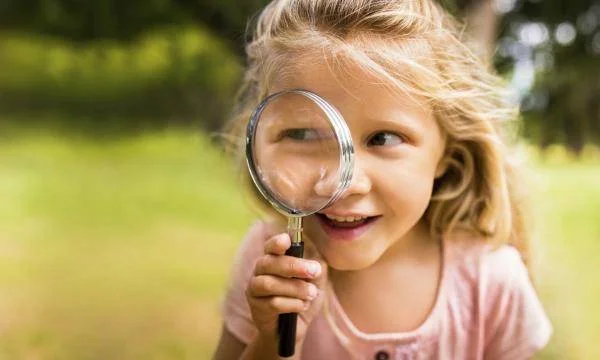OUR PHILOSOPHY
10 things we believe about teaching science to kids;
Kids are naturally curious, and natural scientists,
Kids need to touch, feel, and do it themselves,
Science is not all white lab coats and explosions,
Science is about curiosity - 'looking closely', 'noticing things,' and 'asking questions'.
Science skills form the foundation for future learning,
...and help to develop 21st Century learners,
Science skills build confident learners,
...and build confidence towards science,
Science incursions bring benefits to teachers too,
Seeing science in the familiar world makes the ordinary, extraordinary.
Keep reading to learn more about each of these 10 points.
Curiosity + Exploration = Science
Kids love investigation and discovery.
Kids already engage in science every day! To see what I mean you have to stop imagining white lab coats and instead consider science as ‘looking closely’ and ‘noticing things’.
Children are inquisitive creatures. They are constantly busy ‘looking closely’ at the world around them, and ‘noticing things’ about what they see.
This ‘noticing things’ becomes the foundation for understanding our world. It leads to asking deeper questions, making predictions, and testing out ideas – all steps in the scientific method – and things that children love!
Consider these science investigations frequently enjoyed by young children;
- Pouring water in the sandpit to feel the sand change from dry to wet.
- Dropping a ball on the slide to watch it whizz down – and testing if a handful of gravel will travel the same or differently to the ball.
- Discovering the fantastic sound the metal downpipe makes when you hit it with a stick – and that the wooden poles of the verandah make different, less satisfying sounds.
Kids are great investigators. Inquisitive Kids Science Incursions provide a fun opportunity for children to practice their observation skills, get hands-on and discover more about the world around them.
Science skills form a foundation for future learning.
Science is a process or method we use to learn about our world.
Careful observation leads to asking questions, making predictions and testing out ideas. This model helps children ‘learn how to learn’, and can be applied to any subject area, underpinning all future learning.
Practicing science strengthens a child's learning skills including;
- logical thinking
- listening and observing
- planning and predicting
- problem solving
- communicating
- and fine motor skills
Science skills help to develop 21st Century learners.
Learning and innovation skills are recognised as essential for children who will live and work in the increasingly complex environments of the 21st Century.
The Partnership for the 21st Century, P21, states that creativity, critical thinking, communication and collaboration are essential to prepare students for the 21st Century.
Practicing science builds skills in each of these '4 C’s'. And I would add a 5th C – confidence.
Science skills build confident learners,
Science builds failure resilience by encouraging children to give things a go.
Science is about having an idea, having a go, trying something out and learning from what happens. There is as much learning when things don’t go to plan as when they do.
In science the unexpected result is simply information that can be used to form new questions and test new ideas. This perspective creates an attitude of problem solving rather than one of failure and is essential for confident learners.
...and confidence towards science.
The percentage of science and STEM related jobs are expected to continue increasing into the future. Even those who do not work in STEM will be surrounded by STEM and science in their everyday life.
A basic understanding of science, or science literacy, will be necessary for children to be confident participants in today and tomorrow’s world. Engaging in science from an early age helps children to become familiar and confident with the subject.
Science incursions bring benefits to Teachers too.
Inquisitive Kids Science Incursions provide you with great examples of age-appropriate science activities for your students. Teachers often get ideas from our workshops, and we include teacher notes with every incursion so you have all the details you need to try the activities yourself.
With a science incursion, you get to see which topics spark your students' interest and this helps you plan future classroom activities that you know will engage your students.
It’s also always nice to have someone else bring all the resources and do all the setting up and packing away. We provide plenty of varied resources in our science workshops, and save you the effort and money of sourcing everything yourself.
Science lifts the veil off the ordinary world and reveals the extraordinary.
How stuff works can be amazing for young minds (and older ones too). Engaging in science is rewarding in and of itself.
Why not try some in your classroom today.
